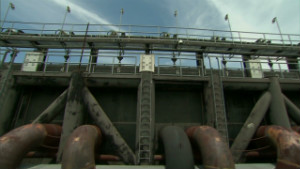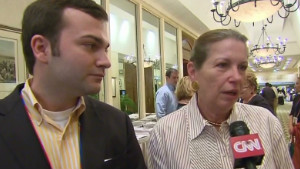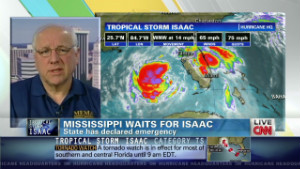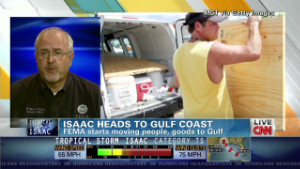Isssac Threatens the Gulf Coast
New Orleans (CNN) -- With less than a day to go before landfall, governments, business and residents in New Orleans and the central Gulf coast rushed to complete last minute preparations and braced themselves to bear the brunt of Tropical Storm Isaac.
"We have a plan in place to secure the city, and we have a plan to respond quickly in the event of emergencies," New Orleans Mayor Mitch Landrieu said. "We're confident that the work we've done in the last few years makes us fully capable of handling this type of storm."
Isaac has taken on an added significance because its projected landfall Wednesday falls on the anniversary of the devastating Hurricane Katrina.
Katrina devastated New Orlean's Lower Ninth Ward in 2005, but resident Herbert Gettridge pledged to weather the latest storm to batter the Crescent City.
"I'm not going no place. I'm going to stay right here and see what happens," he told CNN affiliate WVUE-TV. "I can swim if it floods again."




Gettridge, 89, has rebuilt his home twice -- once after Hurricane Betsy in 1965 and then, 40 years later, following Katrina.
"Whatever damage it does, I can put it together again," he said.
Most of Katrina's nearly 1,800 deaths occurred when the protective levees around New Orleans failed, flooding the city. But Landrieu said the levees have had $10 billion in improvements since 2005, and the city's pump stations have backup generators ready in case of electrical outages.
One of those stations is the biggest in the world and some can move as much as 150,000 gallons per second.
"This is the best system that the greater New Orleans area has ever seen," Col. Ed Fleming of the Army Corps of Engineers said.
The region appeared to catch a break as the system was slow to strengthen.
Isaac is expected to be weaker than Katrina, which came ashore on August 29, 2005, as a Category 3 hurricane with 125-mph winds.
At 5 a.m. ET, Isaac's winds remained at 70 mph -- just under hurricane strength, the National Hurricane Center in Miami reported.
"Strengthening is forecast, and Isaac is likely to become a hurricane later today," forecasters said. "Additional strengthening is forecast until the center moves inland."
Isaac was centered about 125 miles (205 kilometers) south-southeast of the mouth of the Mississippi River, and it was moving to the northwest at 12 mph.




But tropical-storm-force winds extended more than 200 miles from the center, and hurricane warnings stretched from Morgan City, Louisiana, to the Alabama-Florida border. Tropical storm warnings extended eastward to Destin, Florida, and westward from Morgan City to Cameron, Louisiana, about 200 miles west of New Orleans.
There was also the potential for a lot of rain, as much as 18 inches in a few areas of Alabama, Louisiana, Mississippi and the extreme western Florida panhandle, the hurricane center said.
As the storm heads north, its rain would benefit some drought-ravaged states like Arkansas, Illinois, Indiana and Missouri.
Landrieu has not ordered an evacuation of his city, most of which is below sea level and protected by a network of levees. But he said he would "strongly urge" about 900 people who live outside the levee system to leave -- and if anyone else is thinking about getting out, "now would be a good time to go."
Others in low-lying Louisiana parishes and in coastal counties and barrier islands of Mississippi, Alabama and northwest Florida were told to clear out ahead of the storm. In Alabama, state Emergency Management Agency Director Art Faulkner warned that strong winds and high water may affect the Mobile area even if the storm hits as far west as Louisiana.
"It is a very large storm," Faulkner said. "And oftentimes we confuse and focus on a specific dot that may be identified as the center of the storm when very dangerous conditions may exist as far as 200 miles from that specific dot."
The storm lashed Cuba and the Florida Keys over the weekend after slamming into Haiti, where at least 19 people had been reported dead by Monday, the country's civil protection agency reported.
The Hurricane Center projected storm surges of 3 to 6 feet for the Florida Panhandle, 6 to 9 feet for the Alabama coast and 6 to 12 feet for the Mississippi and southeastern Louisiana shores.
In Bay St. Louis, Mississippi, Hancock County authorities ordered residents of low-lying areas to evacuate Monday evening. The National Park Service had already ordered visitors to leave the barrier islands off the Mississippi coast.
Jackson County, which includes the coastal cities of Pascagoula, Gautier and Ocean Springs, ordered evacuations for anyone living south of U.S. Highway 90 -- a major artery along the Mississippi coast -- or for those living in mobile homes, along rivers and in other vulnerable areas.
"Those residents that experienced flooding during Hurricane Katrina should evaluate what the effects of the possible 8-12 foot tidal surge would have to their property and make an informed decision with regard to evacuation," a message from the county Board of Supervisors added.
But on Dauphin Island, south of Mobile, many residents were preparing to sit out Isaac at home, said Alexa Alexander.
"We are boarding up (and) getting supplies ready," said Alexander, who lives and tends bar on the island. "We've had a little bit of people leave Dauphin Island, but not much. Most of the locals are going to ride it out."
Dauphin Island was badly damaged by Katrina, which cut the island in half -- a gouge since filled by sand and rock.
In nearby Bayou La Batre, Alabama, shrimpers hunkered down ahead of the storm.
"All the boats are coming in, we're anchoring them down and getting ready for this blow hoping it's not too bad," Dominick Ficarino, the owner of Dominick's Seafood told affiliate WPMI-TV.
Katrina dealt his business a brutal blow in 2005.
"I lost my processing plant during Katrina all the way to the slab," said Ficarino.
Residents of St. Charles Parish and parts of Jefferson Parish and Plaquemines Parish in Louisiana had been ordered to clear out as well. Some 9,000 residents in Jefferson Parish, Louisiana, were ordered to evacuate Monday morning, along with the towns of Jean Lafitte, Crown Point and Barataria.
"We're worried about tidal surge," Jean Lafitte Mayor Tim Kerner said.
Airports across the region also made plans to shut down as the storm passed. New Orleans shut its international airport after its last flight Monday night, spokesman Ryan Berni said, while smaller airports in Mississippi, Alabama and Florida also announced closures starting Tuesday.
Louisiana Gov. Bobby Jindal called on residents in coastal parishes prone to flooding to voluntarily evacuate.
The approaching storm even shook up pro football player Courtney Roby -- a wide receiver for the New Orleans Saints.
"Kinda a scary feeling of uncertainty," he said via Twitter.
Mississippi officials dispatched 1,500 National Guard troops to the state's three southern counties to help with emergency operations, as well as 45 state troopers to ease traffic flow.
The state has distributed 10,000 sandbags to residents ahead of the storm.
"In short, we have done everything in our power to be prepared for the storm," Mississippi Gov. Phil Bryant said.
Most of the storm's ferocity bypassed Florida's west coast and the Republican National Convention in Tampa, where the schedule will begin in earnest on Wednesday after organizers pushed events back a day over concerns about the storm. The system passed well west of Tampa, although it did soak the bay area with heavy rain and blustery winds.
CNN's Mariano Castillo, Matt Smith, Josh Levs, Dave Alsup, Chelsea J. Carter, Tom Cohen, Martin Savidge, Gary Tuchman and Jim Spellman, and journalist Jean Junior Osman contributed to this report.
****************************************************************
 |
| MCA Now Hiring Home Agents! Click Here to Learn More!! |
Need a better opportunity? Need a new starting line? Come join me and we’ll blaze the trail together working from home and making the most of our lives! Click the link! Take the risk! Make the investment! Start today on your new starting line!
Mony Coleman
Entrepreneur and Way Maker
Twitter: @MonyColeman
Email: mony.coleman@gmail.com

